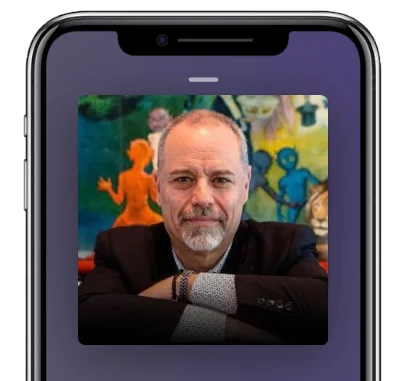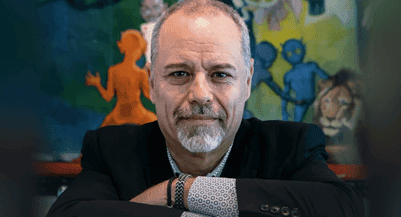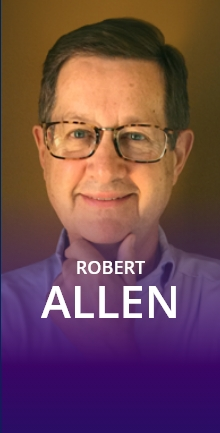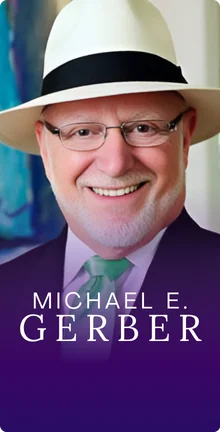Hey, thanks for having me.
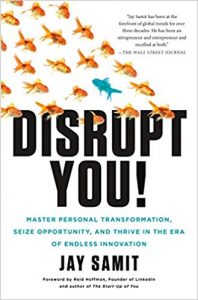
Alright, you got a book called Disrupt You! What is this idea of disrupting yourself? I’m sure listeners are very curious as to what that means.
What you learned in school, in college, and in most jobs was how to be a cog in a wheel, how to just take a job, and that doesn’t get you happiness and success in life. If you are looking on how to break on that, how to become an entrepreneur, how to follow your own passions and dreams, and at the end of the day how to solve problems, whether they’re yours, your family’s, your friend’s, or society’s, that’s what disrupt you.
Change starts from changing within and what drove me to write the book was I grew up as a regular working-class family type of background. If you would have told me that dozens of my friends will become self-made billionaires, I would have asked you what you were smoking. When you wake up and see time and time again how easy it is now that we are one-click away from six-billion consumers, anybody has the opportunity to change their life and change the world. Disrupt You! really lays out a road map for people to do self-disruption.
We have to talk about that road map, but before we do, I’m curious how many billionaires do you actually know?
I’m not going to stand here and drop names, but I’ve been partnered on projects with Bill Gates, Steve Jobs, Richard Branson. The intro of the book was written by Reid Hoffman, founder of LinkedIn, and so many others. I could go on and on.
That’s impressive. Let’s talk about this process for disrupting yourself to get outside of your comfort zone. What does that look like?
What it really is, there’s a little voice that’s been telling you what you can’t do and that voice was instilled by parents and teachers who wanted to save you from failure. Most of your life you’re listening to people who gave up on their dreams and, in essence, wants you to do the same. They didn’t succeed so they don’t want you to suffer.
If you think about a small child, if you look at a little two-year-old, they don’t sit there for one day to ponder and ponder, and say, “Aha, today I shall walk across the room.” They stand up and they fall down and they figure out what didn’t work then they stand up and fall down. That’s what being an entrepreneur is. That’s what being successful is. This myth that you are Doc Brown sitting on the toilet and you come up with the flux capacitor, nothing could be further from the truth.
Some of the most successful businesses that you know were one board meeting away from being shut down or complete failure until they pitted in and discovered something new. I’ll give you a great example. A decade ago when broadband came out, there was already online dating for the young folks. There was actually dating before swiping left or right. When broadband came, instead of dating sites having still pictures you can now have videos. Three guys came up with this idea, “Why don’t we set up a website called Tune in, Hook up where you can see videos, hear the person’s voice, and see their personality, and we are going to make a fortune.”
To make a long story short, they put the site up. They did everything. Write the interface. It was fantastic and it bombed. Why did it bomb? Because of the losers that went on the site. The first guy that put up a video, he was standing in the zoo in front of the elephant cage, that really gets the ladies. But they looked at the data and the same disrupt you have come back to data a lot. They noticed something that they didn’t know going in. They noticed the people, though they wouldn’t date these people, want to share the videos and show everybody else the collection of losers that were there. So they change the name of Tune in, Hook up to YouTube and became billionaires in their first year.
Great story. I actually saw that first YouTube video. That’s one of the founders in front of the elephant’s cage.
Twitter was no different. I can go on and on and it’s not just about tech businesses. By the way, I don’t care whether you’re starting a restaurant, consulting a small one-man firm, you are in the tech business. The first thing you look at is your screen in the morning and the last thing you go to bed. Every person hearing my voice right now has written more codes than Steve Jobs, let that sink in for a second. The first man to build a trillion-dollar tech company, couldn’t write a line of computer code.
Solve a problem for five people, you're popular. Solve for a million, you're rich. Solve for a billion, you change the world. Share on XYou only need two things to succeed. You don’t need an engineering degree. You don’t need to go to Harvard and get an MBA. There are two things that you need. Perseverance, and that can’t be taught. That has to come from the belly or come from external factors that force you to you learn to walk in the middle of a desert to find water. The second is insight. How do you find the insights? How do your unmet needs that are going on right now? That can be done, that can be taught and I have a process in Disrupt You! that guarantees more deal flow in 30 days than any VC firm would get. You can literally see what are the unmet needs of society and decide which billion-dollar opportunity did you want to go after?
That sounds really enticing. Can we play with that?
Sure.
Awesome.
Here’s the challenge. You should do this and maybe we’ll come back in 30 days and tell me what you came up with.
Okay.
Every day for the next month, I want you to write down three problems in your life. It’s a pretty easy thing to do. Today you were in traffic or whatever it might be but after a day or two, that challenge gets really hard because you’re not seeing problems. Because you’re so used to doing things the way they’ve always been done, you don’t think that there might be a better way.
Again, use the three guy approach. Three guys were in traffic in Tel Aviv. One guy realized, “Hey, the phone company knows where my car is. If I go left and they tell me to go left and they tell somebody else to go right, there will be no traffic.” That was Waze.
A reader of my book wrote me a great one. He got up one morning, was taking his medicine, the phone rang, took the phone call, got off the phone, and then did he take his medicine? If he did then he could OD, if he didn’t he won’t get well. That’s a problem. Took a happy meal watch, put it on the lid of a bottle, every time you close it goes to zero, you could look at the bottle, “Oh, I opened it three minutes ago or I haven’t opened it for eight hours.” Built a huge company and those caps are being used for everything including to limit when opioids could be opened.
It is that simple. It is getting your mindset out of what you’ve been told that you can and cannot do or this is the way we always do it. If you work at a company and your boss says, “This is the way we always do it,” run for the door because that job that you took that you think gives you security is an illusion. Of the original Fortune 500, there is less than 27 left. Big companies don’t give you security. Big companies aren’t going to be around forever. Every 48 hours, there’s a new self-made billionaire. Let that sink in. What did you slackers do this weekend?
Watch Netflix, right?
And they didn’t go to the best rules. Netflix is a great example. Netflix, when they came out, remember they were mailing DVD in the Mailflix. They didn’t name themselves. They told their competition what their goal of the business would be and what did Blockbuster do? Absolutely nothing.
I’ve come up with so many entrepreneurs in the world, somebody is going to steal my idea. It is so hard to be successful, most people aren’t willing to do the work. Nobody is going to steal your idea, nobody is going to beat you to the punch line, and there are so many unmet needs. Solve a problem for five people, you’re popular. Solve for a million, you’re rich. Solve for a billion, you change the world.
Every day, billions of people use apps and technology that I’ve been a part of and that’s just awe-inspiring to me. I don’t get to live forever. I don’t believe in reincarnation. Those that are listening who do, you got a head start on me. But my idea is the things that we do, the impact we have on our world leaving it a better place, that can be immortal. That’s the exciting part of this.
What are you doing to change the world?
I’m on the board of a bunch of companies. One is basically—they’ll hate me calling this—a Roomba for farmers. It goes out and it can actually detect which is weeds and which is the plant and eat and kill the weeds so that you don’t need herbicides. It protects against pesticides so now you can yield more crops, have less poison on our food. I’m on the board of the company called Abra that solves the cryptocurrency so that you don’t have to use exchanges and you can trade any fiat currency, gold, and basically brings credit on the two billion poorest on the planet so that they can have access to money and credit and lift themselves out of poverty. I’m trying to tackle big problems. When you consult to presidents, popes, and major corporations, you have an entrée to the people to make decisions which means you also have a responsibility to try to use your knowledge to solve the biggest problems that you can think of.

Very cool. You’re also getting your message out there that people can and should go off their butts, get out there, change the world, and not just wait for somebody else to do it. You have your book. You have your TED talk.
Everybody thinks of changing the world, but nobody thinks of changing themselves. At the end of the day, I love living in a free country with democracy and you only have democracies if you notice in countries that have a strong middle class. You only get a middle class from people creating jobs and the only people that create jobs are entrepreneurs. The biggest thing that annoys me, because everybody thinks an entrepreneur is somebody that sells something. No, that’s a sales guy.
Nothing wrong with sales guy; that’s an important role. An entrepreneur solves the problem. That’s all you do and unless you think the world is fully formed and perfect, then there’s a lot of problems that you could solve. It is that easy. Last year, I’ve gotten my books in eight languages and all over the world. Number one in Thailand, Vietnam, all kinds of crazy places. I get emails from everybody on how the book just changed their lives.
I’m not selling coaching or services. I’m not trying to make a dime here. I want to help, but occasionally, I get an email from a millennial, “Disrupt You! is so motivational. It’s so this, but I could never do this.” And my skin is as thin as the paper around the sushi.
Last year, I took a millennial kid that was couch surfing, parents weren’t on welfare, didn’t have a network, and never made money. I coached him for one day a week for a year and took it from homeless to a self-made millionaire. I didn’t introduce him to anybody. I didn’t give him any capital. I didn’t tell him what business to start. I just took the process that’s in Disrupt You! and held him to it.
The funny thing was, I asked him to keep a journal and about six months in, his first month he made $70,000. He would listen to anything at that point, but at six months in, he gave me his notes from our first meeting where it said, “This guy is full of it. His advice is the dumbest thing ever, but I don’t want to miss this opportunity so I’ll go along with it.”
He called me this morning. He’s in Europe. He’s having the time of his life. I don’t have time to get on the phone, sit down, or have pizza with every single human being. So, I wrote the book as a way to scale this knowledge. I give back by teaching at the country’s largest engineering school on how to build a high-tech start-up.
I chose two of my students that did $150 million in the first year. Yes, that’s the exception to the rule, folks, but it’s also the tough conversation when you tell your kids, “You really shouldn’t hang around to get a degree. You might want to focus on this project a little more.
Yes, university degrees aren’t what they used to be. Not necessarily the right thing for everybody to stay in school.
Nothing is the right thing for everybody. No one led a nation or company by following the path of somebody else. That was one of my biggest complaints in reading these successful people’s bios. If you could go back to World War II and do exactly what Jack Welch did, you could end up heading GE. The world’s changed, so how can you teach people to live in an era of endless innovation?
We will never have stability. We will never have the sameness. We’re growing at exponential rates and the new exponential technologies. 5G, heads-up displays, things will allow us to always have information coming to us. We’ll be leading the era of searching for information via Google and our environment conspiring us to bring information. Think of all the new goods and services. Ten years ago when the iPhone came out, one of the top ten apps was a fart app. Nobody could figure out a better use of apps, right?
Somebody thought of OpenTable. Somebody thought of this app or the other thing. Millions and millions of dollars changed hands. Well, we are now going to have a heads-up display, always be connected every waking hour. We have autonomous vehicles, so we’re not staring at the windshield for four hours a day. What are the new opportunities?
Everybody thinks of changing the world, but nobody thinks of changing themselves. Share on XSpeaking of autonomous vehicles, I’m in Abundance 360, Peter Diamandis‘ group. Were you at the Abundance 360 conference?
No, I keynoted his Singularity Global. Peter’s a great guy. He wrote a nice blurb that’s on the cover of the book but I wasn’t at Abundance 360.
Okay. It’s a great event. Autonomous cars, they’re supposed to be so disruptive that in 10 years’ time none of us or very few of us will still own cars.
I could tell you 18 months ago, fossil fuel cars peaked. One of the big three automakers was one of my major clients. I’ve been a CEO of a public company and I wouldn’t want to trade places with him. No one’s buying cars, no one’s leasing cars, and those that are buying are buying autonomous vehicles. The autonomous vehicles being manufactured today are designed to be fleet vehicles that when you go to work, your Tesla then goes and earns money for you as it drives around all day.
The real secret sauce on this topic that Elan did beautifully is his self-driving vehicle still has a steering wheel. So, if grandma that would never get into a self-driving vehicle wants to use that Tesla taxi, it comes and picks her up. She has a choice. Does she want to sit in the front seat and drive to church? Or sit on the backseat when she wants to drive to church, get out, and then the Tesla goes on to pick up the next person. There goes a disruption of auto insurance. There goes a disruption of parking lots. There goes a disruption of needing to be urban centers. Imagine how this changes to travel and vacations.
Now, you can get to your house and I don’t care where you are. Eat in the car, watch a movie, go to sleep, wake up, and you’re at Yellowstone.
My dad, when he took us across the country, that was a major feat. He had one arm at the window, bright red and sunburnt and he put an 18-hour drive day and we learned to sleep in the backseat. Now you can play your video games. I can’t wait for the self-driving motor home. I’ve been to all 50 states and I’d love to do it again and this time not have to stare out the windshield.
So back to this idea of picking up a guy on the street who was, you said he was homeless.
Well, he was couch surfing. I wouldn’t call him a homeless.
He grew up on welfare. His parents were on welfare, lived in public health housing, but he was motivated. I planned on coming out with another book telling the story, but there is a thing called The Pygmalion Effect. If you tell a teacher that within a school year that two of the students are super smart and they’re going to have excel and break out this year, if you look at the end of the year, they do phenomenally well because the teacher gives them more attention, subconsciously, because she believes they are special.
Same thing with him. His name is Vinn. I told Vinn that out of all the people I interviewed I was picking him because of this, that, and the other things when in fact, he is only the first person that I found to make it not stack like, “Let me find the one in a thousand that would achieve.” The point was to show that it wasn’t rigged, that anybody can do this.
What was the opportunity that he sees that made such a huge difference for him because he didn’t invent autonomous cars or something?
No, and he’s not an engineer. He wanted to do, like many millennials, social media marketing. He understands and has insights into what he believes is Facebook and Instagram marketing should be. In Disrupt You!, I said that you either have to be the best of what you do in the world, which is really hard, or the only one doing it because if you are the only one doing it, by definition, you are there for the best.
What’s a new category that suddenly needs social media marketing that no one is marketing themselves as an expert in that people will be willing to pay top dollar. When you start going down that decision tree, at that moment in history, 18 months ago there was a new thing called ICOs—Initial Coin Offering—for all the thousands of cryptocurrencies that came in and went. But each one of those was racing to get to market. The second he started promoting himself as the agency for cryptocurrency marketing, many lined up around the block of customers.
The second you get your first customer, people will say, “What experience did you have?” Well, I did this one. Now you’ve done two. Now you’ve three. Now you’ve done four. That’s how it goes.
And sometimes you don’t have the experience, you have to start somewhere, so you just donate the first one. I started doing SEO many years ago back in the 90s but we were building SEO into eCommerce websites that we are developing for clients. We weren’t doing SEO audits or SEO consulting for companies that didn’t want a website developed. Then 2000 or so, we started offering that service. One of the best decisions I made was to offer a free SEO audit like a full, comprehensive, expensive SEO audit for free to Target. In exchange, they would just give me a testimonial quote and use their logo, so target.com.
Yeah. Now you can say that Target’s your client. That’s absolutely brilliant, everybody should do that, and it’s easy to do. Another way is to do some cost marketing for some great cause because the board is made of CMOs and execs of top brands.

I had an ad tech company and did it the same way. It had zero revenues, went in there and offered to do things for a number of brands, and I incentivize the sales team. I said, “We are going to collect logos and I want one for every letter of the alphabet.”
The company was failing and was out of cash money when I went it. 18 months later, we sold it to Fox for $200 million. I had not done any revenue or be a part of those 18 months. It’s a tried and true method.
It sounds like you’re a turnaround guy.
I’ve done that. I spent most of my career sitting at empty rooms, start a company, and sell it then I did three turns as an entrepreneur. I was brought in to turn around and create new opportunities in giant companies. I was number three worldwide at Sony as president at EMI. Industries that are suddenly caught off guard by disruptions. I’ve seen it from the corporate side. I’ve seen it from the public company side. I’ve seen it from the VC. I’ve raised hundreds of millions of dollars for startups. That’s why I felt I cracked the code. It wasn’t something complex that I want to share and make the journey easier for the next person.
And you started with Vinn. Just picked him off the couch, essentially, and turned his life around.
Yeah, but the same things happen to students and the thousands of readers out there. It was funny because I thought I was writing the book for people in the U.S. and people that have access to capital. The responses told me that there’s this thirst for success. There’s a thirst for change and problem-solving is innate in human nature and it’s truly global. I’ve heard from people in 140 countries, the next two languages when the book comes out—here’s a trivia for those listening—Igbo and Hausa.
Tell me more.
Each language is spoken by over 200 million people and two other languages in Nigeria. A Nigerian has tremendous advantages over you. He has access to the same six billion people. He’s one click away from all of them, but his cost of employees, his cost of engineers, his cost of housing is cheaper.
Think of 99designs if you haven’t used it, that level of playing field of creative talent. You don’t know if the person making your logo is sitting in Manhattan at an ad agency or sitting in Botswana and it doesn’t make a difference. If they’ve got the talent and they do something great, they make a fortune.
That’s true. Even the idea of speaking multiple languages may become an obsolete concept as the universal translator’s concept will take hold like in Star Trek.
It already is. Google phones will do that today. I speak in many conferences where people are doing that and now the new ones with AI will actually make the translation voice your voice. So my voice can speak to you in your native tongue with my inflections and idiosyncrasies. Mike Tyson could speak Chinese and would sound like Mike Tyson.
Amazing. Then there are the deep fakes out there so you don’t know if you could trust any video you see out there.
But these are great examples of the engineering that went into creating these things is monstrous, yet nobody works on these things with a business plan and an idea of how to bring it to market or what use and what problem it solves. When drones came out, everybody like flying or whatever. I was hosting the Wall Street Journal series on startups and we had a competition. The one that won figured out that you could take a regular drone, fly it over pipelines, and see where there are leaks. It saves manpower, time, energy, and environmental damage. Just by taking a regular, off-the-shelf drone but marketing service to do that, these guys became multi-millionaire the first year.
That’s great. You don’t even need to invent anything new, you just have to have a different use case.
And that’s the whole point. Like back to school, in school who invented the printing press?
It wasn’t Gutenberg. It was the Chinese, right?
Well, no. The Chinese had a movable type. The printing press wasn’t invented. This is where I get so frustrated. You go back. Gutenberg was 1500s. Go back to the year zero. The Greeks got tired of crushing olives to make olive oil and someone figured out how to make an olive press. Not that complicated, you squish down olives to get olive oil.
It took another 1500 years for somebody said, “You know what? If we make it bigger, we could put grapes in one of these things and we don’t have to stomp on grapes anymore.” All of a sudden in 1500 Germany, everybody became a vintner and they made more rieslings than they do today. Every vintner went bankrupt and now there are all these used presses just sitting there that nobody’s going to use for. Gutenberg playing with his little type looking up at the window and goes “Aha.” Repurposing things, right?
Everything can't be a success. But if it's not, then it’s a learning experience. You win either way. Share on XSilly putty was created by the U.S. Defense Department during World War II to replace rubber. Play-Doh was wallpaper removal. There are many things that are invented that failed for the use of somebody who invented it.
Post-it notes. That was a failed adhesive that didn’t stick well enough and they used it on Post-it notes.
By the way, there are tons of patents you can get for free and get access to. NASA posts them all up there. One of my favorites is they went up to the moon, for the 50th anniversary for this and they wanted to pick up moon dust. You start to pick up something in no atmosphere so they had to make a vacuum that would work on batteries. Black & Decker did than then after we got the moon thing they said, “You know what? People might want a dust buster.” And it goes on and on.
So, what’s stopping you? If you hear my voice right now, what’s that nagging thing? You’re not good at math because you missed a problem in your third grade? Well, now you know what seven times seven is, get over it. You’re afraid to speak? Go out and speak. It’s about that self-disruption. It’s like being a plastic surgeon, but you hold the knife.
Here’s the secret to the whole book. Once you change that immalleable voice, that thing that you so believed was who you were, you go, “Wow. I can change anything if I can change me.” And it’s true.
Yeah. It all starts with you.
Yeah. I was a dyslexic kid that was told, “You’re stupid,” basically. But so was Richard Branson, so was Walt Disney, so was Patton, so was one-third of all CEO’s were dyslexic. It turns out it’s a gift, not a curse.
Do you find that dyslexia still affects you and your ability to read or anything like that?
In all the positive ways. I’m a non-linear thinker. That means I can come up with solutions to problems that others don’t tend to see.
It doesn’t mean that I don’t read. I don’t know why we put all this importance on the speed that you read. When I was in elementary school, they had a speed reading machine where you’re supposed to just learn to read faster and move your finger. I’m more on comprehension, I’ll get there.
They are measuring the wrong things in a lot of cases.
Yeah. That’s what’s most wrong in most corporations. Natural opportunity. When you’re running a big public company, let me tell you what their focus on. They are not focused on inventing new things and creating a new market. They’re focused on how do I hit my numbers for the quarter.
When I was at Sony, all the top management in Tokyo saw their competition at the golf course on the weekends. It was Panasonic, it was Sanyo, it was Toshiba, etc. They didn’t see Apple. They didn’t see these other companies and that’s where they disappeared. Kodak invented the digital camera, let that sink in for a second, in the 1970s, but because the profit margin of it wouldn’t be the same as film, they thought they could bury it. Where’s Kodak today? A hundred-year company puffed out of business.
And the car companies, their biggest threat isn’t probably even Elon, but it’s Apple, right?
Well, it’s the business model that has changed or why do we need transportation. A car spends most of its time parked. Somebody solved that. Once the Uber-ization concept came out, everything will be optimized. You have excess designer clothes? Rent the Runway. Do you have excess space? Airbnb. We now have efficiencies of markets and none of these companies were optimized to run efficiently. Airbnb pays for how many employees and how many property taxes for how many buildings? None.
By the way, a hotel doesn’t own all those buildings. Those are franchises. Just like the taxi cab guys with the taxi licenses. You now see massive change and I could do a whole show on what happens when the government isn’t the ones issuing most of the huge currencies. We heard about Facebook’s currency, Amazon has its currency, would your babysitter be happy being paid in Amazon versus Uncle Sam? What happens when governments aren’t able to figure out how to tax and they can’t print their way out of recessions? Fundamental changes.
The biggest one is with all this optimization, half of all jobs will disappear over the decade. If you’re sitting next to somebody, looked them in the eye right now, one of you two is in for a big shock.
Unless you embrace the change and you run towards it, right?
Well, you’re guaranteed that your career is going to be disrupted. That is a fact. I speak for all kinds of industries; the medical industry. I was vice-chairman of one of the largest accounting firms in the world. Accountants, that’s all going to be software. Audit, that’s all going to be AI systems. What would these hundreds of thousands of professionals do? What happened to the music industry?
You can let it happen to you, but it’s not about what happens to you. It’s about how you respond and that’s what Disrupt You! is about. That’s where I’m here to talk to you today. That’s why Disrupt You! is probably the greatest thing that can happen to you. Losing your job might be the best thing because it can finally push you to do that thing that you want.
If you have one inkling of fear, go visit your grandparents or go to an old age home and ask the people there what they regret in their lives. Not one will tell you something that they failed at. They’ll tell you something they failed to try. It still haunts them. “If I’d only started the band.” “If I’d done this.” It doesn’t mean everything will be a success, but if it’s not a success then it’s a learning experience. You win either way.
So many people have these fixed mindsets and they all see the sunk costs as something they can’t walk away from. For example, somebody who invested their life savings in the Taxi Medallion said that they could drive a taxi in New York City and now you’re seeing all these Uber drivers popping up. All their friends are becoming Uber drivers and they are still driving the taxi because of the sunk cost and their fixed mindset.

I’ll tell you that a fixed mindset and the sunk cost is the biggest problem. Today is a fresh slate. You woke up today. Today can be better than yesterday. You have the power to make it so you can change your life. How many minutes or hours of today are you wasting with that mindset thinking back to yesterday’s problem? Yesterday’s failure? Yesterday’s mistake?
You’re wasting this new time to work on your new opportunity by beating yourself up over something in the past that’s gone. The past is gone. You only have the present and right now, that is limitless.
I’m not some tree-hugging hippy. I did the research on this to see what the power positive thinking actually does. The endorphins are released; the synaptic nerves light up. Positive thinking has a greater effect on your brain than cocaine or sugar. You will be more popular, you will get laid, you will seek more opportunities, or you could shut down and be that person that comes into work every day with that complaint on their mind. They wouldn’t see an opportunity that hit them in the face, so it’s really back to you.
I remember Ephraim Olschewski whose been a guest on this show telling me what he tells his kids when they were getting into a tantrum or something. He asks the question, “Are you complaining or are you creating?” If the kid is trying to figure out how do I get my iPad from home and creative thinking might be, “Maybe I can borrow my dad’s iPhone and play games on that one while waiting, instead of having a tantrum because mom and dad won’t turn the car around and go get the iPad.”
Yeah, it’s all about mindset. Another one, a lot of people ask me what should my kids do when they grow up? The world is going to change endlessly, so one, you have to dedicate your life to continuous learning, but the other one stops asking kids what they want to be when they grow up and start asking, “What problem do you want to solve when you grow up? What problem did you solve today at school?” You change the mindset of what it’s really about to be alive.
And if you are also in this mode of constant learning and up-leveling, if you have this subtle shift in how you absorb the information that you want to teach it to others and not just use it yourself, your retention rate goes from 30-something percent to 90%. I forget the exact numbers, but it’s market, just that one subtle difference learning with the intention of teaching it to others and you could actually apply this, makes you pick somebody off the street or off the couch or whatever, and help them to up-level their lives as you did with Vinn, or like I had another guest, Robert G. Allan on this show. He picked somebody off the unemployment line and helped that person make a big pile of money through real estate in a very short period of time.
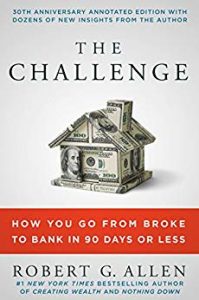
He actually wrote a book called The Challenge. If you can do that, Robert Allan can do that, then we as a people listening to this podcast episode can do the same thing. We can pick somebody off the street and change their lives and in the process create a framework or a model that we can then push that out to a lot more people and we are learning in the process. We are retaining the information a lot better because of our more powerful intention.
There’s nothing more rewarding to the soul and spirit than helping others. By the way, if you are looking for that mentor, LinkedIn has millions of them. Find somebody in your field. Find somebody that achieved something. Reach out, “Will you be my mentor?” Reach out asking a question. Start a dialogue. Build a relationship. You’d be amazed by how many people want to share their expertise and their knowledge, and want to give back, and want to pay it forward.
One of the ways that I’ll pay it forward right now if you made it this far in the episode is I have a free 40-page workbook so you can start right away disrupting yourself. You can get it at jaysamit.com and it’s free. There’s nothing for sale on the site. There’s no upsell or anything.
That’s awesome. Thank you for that. What if somebody says, “I got imposter syndrome.” Or maybe they don’t even realize that they have it, but they have it. What can they do to get past this false belief that they’re not worthy or they are going to be found out, that something is just like a house of cards that’s going to fall down once they start putting themselves out there, what do you tell them?
I don’t know anybody that was born a brain surgeon, so I don’t care who that person is or what is their expertise. They all started at the same place where you are now. You don’t have to see all the steps on the road. You just have to see the destination, work backward, and start figuring out what you need to do. Somewhere along the line, that brain surgeon pretty much knew he had to go to med school, and before that, to get into the med school he has to go to college, before that he knew he had to get into college, and it’s the same thing.
Today can be better than yesterday. You have the power to make it so you can change your life. Share on XWhat you realize is that it doesn’t take 50 years, or 20 years, or 30 years or whatever to master or get into the game. It just takes willingness and you’ll figure it out. There’s so much knowledge. There are no gatekeepers to capital anymore. There are no gatekeepers to knowledge. The world is flat in the positive sense of the word. It’s really what advantage do you have to succeed? The advantage is you have lived your life. Only you have seen the problems that you had seen, but your problems aren’t unique. What’s a problem that you have that you like to solve that many others had.
It’s like when I teach a class at college, the first week everybody’s business plan is how to get food delivered to the dorms. I’m like, “Wow. You’re really solving a big global need.” But once they break down the steps it takes to do that for the same amount of steps, you could build a company that is worth a billion dollars. Which problem do you want to solve? It’s fun and you’ll meet like-minded people. When you surround yourself with positive change agents, it is infectious.
Spend time with me and I’ll cure you of disbelief that you can’t do anything because I wasn’t supposed to. None of these people were supposed to and none of us set out saying, “I’m going to start this company because it’s going to be worth a billion dollars.” Nobody knew what a billion dollars was. It’s insane. The fact that the path in doing it is so short nowadays and getting younger and younger. Kylie Jenner, a self-made billionaire at 21. Now you go, “Well, her sister’s famous and her family’s famous.” Wow. None of them made a billion dollars, so go on.
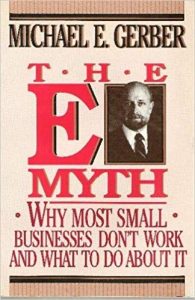
Exactly. Now for folks who want to fix their existing company instead of starting fresh, you know there’s this great book called The E Myth and E Myth Revisited. Michael Gerber, in fact, the author, has been in my show. In the book, he talks about creating NewCo and not trying to fix OldCo because it’s just got to be built from the ground-up with all the systems, thinking, the processes, standard operating procedures, scalability. All that needs to be in from the ground-up.
Yes and no. There’s no blanket statement for anyone. What I try to do in Disrupt You! is to change yourself. I explain the value chain in business from R&D through sales and then to do it internally for yourself because you have all those components in yourself, how do you disrupt your brand of who you are and all those things.
Then look at which piece of the business captures the value. That’s where most people get lost. It’s not about I’m building a business and I’m going to own everything, soup to nuts. If you really look at each individual business, there’s a whole lot of work that goes to whole lot parts of the business that doesn’t really have any real profit or margins, so why not just focus on that piece that has the most profit?
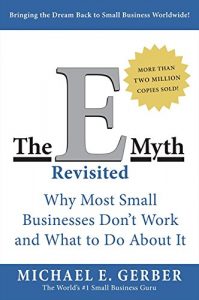
That was the genius of Uber. Taxi, you’re just making the money of connecting the person to a driver. Why do you need to have all the infrastructure? Hotel chains did that airline booking reservations. So, all those things if you could start thinking in terms of value captured instead of value creation, you just accelerated your success rate.
Okay. Can you give an example from your own life where you focused on that value capture?
Sure. When digital music came along, I was running one of the world’s biggest record companies and there was not a lot of margin in digital music. It used to sell $15, now you are going to sell a song for 99 cents. You start figuring it out, it doesn’t make a whole lot of whatever. But I looked one day and I saw that all the digital music companies that were coming along, the Spotify’s and the Pandora‘s, actually had a market cap greater than if you bought all the music labels. So, one source of revenue was being valued greater than the pond that you were drinking from.
I went to these companies and instead of saying, “Okay, pay me this much for music and this that and the other thing,” which is what everybody else in my competition was doing, I said, “Hey, here’s access to all this, but you’re going to give me some of your stock because I’m giving you more valuable.” So the first year, we sold zero tracks and we made a $100 million profit. In the second year, we sold some tracks and made a couple of hundred million dollars in profits. We focused on value capture.
Very nice. I’m curious, you mentioned earlier heads-up displays. Where do you see an opportunity there because I’m thinking about taking this to the umpteenth degree and then you got Minority Report the movie where you’re just waving your hands around in thin air and doing all sorts of fantastical stuff.
I’ll make it real. I’m obsessed with augmented reality. We are within two years of pretty much all of us. Here’s my way to convince those that are skeptical of this future is already here. The big guys have invested billions on the hardware and the hardware is coming out. Last year in the United States, 80 million pairs of glasses were sold for more than $150 a pair that came with one app, Focus. Another 50 million pairs were sold that came with one app called Sun.
If a pair of glasses will solve something, give you focus so you could read or block the sun so you could sit at the beach, people are willing to wear glasses. If you now have the same weight and everything, you have a 5G network out there, and you can now have heads-up displays to tell you, you can just ask where’s the nearest vegan restaurant, or which way to the zoo and follow penguins down the sidewalk, or where did I park my car, or how do I get to the Niagara ballroom in the hotel and there’s a row of M&Ms like you’re ET, we will all be buying these. But then, the question is what other great problems just like when the iPhone came out. Right now we are spending 12 hours a day consuming media. Imagine if it’s every waking hour.
By the way, it’s not just additive. I’ve consulted some of the biggest brands on this. When you go into that supermarket, there are 40,000 different skews on the shelves. It’s overwhelming and I have never gone to a supermarket. The few times I do for research, it’s like, “Oh my God. There are so many choices.” But now, wearing augmented reality glasses, it’s also subtractive. You can say, “Just show me products that I can have on a keto diet, or just show me things without sodium or something that a diabetic can have, or a better halal or kosher, or just show me the ingredients that Oprah talked about.”
Suddenly, everything else on the shelves disappears, literally disappear and you just see those things. Now the question becomes, how do you compete as a brand if those few people that would be controlling the interface just like Google control search today, make you disappear. That’s a whole new version of retail.
I actually bought a pair of glasses that doesn’t display the TV screens, which is pretty wild. It doesn’t work on all screens, but for most of them, let’s say you are going to BestBuy or something, you put these on. All those screens just go black. It’s pretty wild.
And their billboards will change outside and be personalized and everything else; some really great uses. If you are a wine person, but not an expert, you go on to wine shop and with 10,000 bottles of wine. You say, “I just want to see French. I just want to see French that tastes like this. I just want to see that it has a Yelp review,” whatever it might be.
More importantly, the information will come to you, so you’re walking through the rain forest in Costa Rica, it’s so beautiful, so magnificent, and all of a sudden a snake bites you. You don’t want to look up the Latin name of the snake. You don’t want to know the genus and species. What you want to know is it poisonous and how many minutes do I have to make a phone call. Now your glasses will tell you these things. I have a filter that tells me every species of plant whether it’s edible so you can walk around and decide what you want to eat.
That’s pretty cool and it won’t even be glasses. After a while, it will be contact lenses.
Yeah. One of my client companies, a big software company that everybody knows actually has a team that has contact lenses that function today. They don’t have a price on manufacturing, but I refer to that as witchcraft. The science is beyond what I can comprehend.
Even today, you don’t have the glasses, you can at least start thinking about these new applications. For example, with a very smartphone that you have, you probably have the Amazon app installed. I did this with my wife yesterday when we were at the cooking class. I pulled up the Amazon app, hit the icon for the camera, and then we were taking pictures of some of the cutlery, special fancy knives, and all these different gear for the kitchen because they have all the best stuff at this cooking school. Some of them were cheaper at Amazon, some of there were more expensive on Amazon.
That’s called showrooming, but that’s without AI. Let’s go to real AI. The number one reason things are returned at Ikea is it didn’t fit. People are spatially challenged. Their app, your standing in your living room, it will show you that sofa or table to scale in your own room before you buy it. Instead of standing there and doing nine swatches of beige on the wall to know which one will make your partner happy, you can just sit there with an app and look at the room and all these different colors at different times of the day.
You can try on makeup virtually and see it on yourself and see how it looks. It goes on and on. That magic makeup mirror will very shortly have another benefit of why you want to do it because it’s going to keep track of the moles and things on your skin and say, “Hey, something has changed. You should see a dermatologist. It might be skin cancer.” Wearables will be telling you information instead of you going to the doctor after a heart attack. How much would you listen to your Fitbit if it says, “In the next four hours, you’re going to experience a heart attack”?
Make them the hero. You're the guy, they're the hero. Share on XYeah. I read about how this one medical expert—I forgot if he was a surgeon or whatever—noticed some strangeness about somebody on TV who was on a live interview. There’s something about him that he just thought, “This guy is going to have a heart attack or stroke,” or something. I forgot what exactly it was, but he contacted the TV studio and saved the person’s life because they were about to have a major medical event happen. They had no idea, so imagine AI scanning.
Imagine AI when you’re walking anywhere, an airport or in public and knowing these things will happen ahead of time and can save lives and times. Absolutely. Right now, a number of nations when you walk through their airport, they are taking the body temperature of every person to stop this spread of communicable diseases.
Wow, I had no idea what was happening. It’s crazy. “Excuse me, sir, can you please step aside? We need to quarantine you.”
No, they are going to walk you down the hallway and they pull you out. The other one that I find really fascinating is there’s a company that figured out human intent based on gate, based on walking so they know who’s the shifty character is, that somebody is not walking the way, somebody that isn’t nervous about doing something bad, so that minority report issue can identify the perp before the horrible thing happens.
It’s just phenomenal the space of the change. But somebody laid the groundwork. Somebody spent billions and billions of dollars to give you an opportunity to make a really simple little use case of this stuff that already exists. You don’t have to make the glasses. You don’t have to make the phone. You don’t have to make the 5G network. You don’t have to know how to use a computer.
You don’t even have to download the software development kit, the SDK. You get somebody on Upwork to do it for you.
I’m in my 50’s. When I graduated high school, this movie Star Wars came out and I went to college and I was like, “Oh my gosh. That was the greatest thing ever. I want to make special effects in Hollywood. I want to do this.” I got out of college and go, “I want to do this.” A couple of minor problems. I didn’t know anything about computer graphics. I didn’t know anybody in Hollywood. I knew nothing about special effects.
I set up my first company with just a business card that I got printed—100 business cards for $1 —and I knew because I was 21, no one was going to hire a 21-year-old company guy. So, I didn’t make myself head of the company. I went around as a sales guy for this nonexisting company called Jasmine Productions, and then lo and behold because I could charge less than big companies, I instantly got some work doing special effects in movies.
I had no idea how to do the special effects work, but I didn’t have to because all I had to do is hire the people that know how to do that, that don’t have the guts to start their own company, and I’ve been basically doing that for 40 years.
Very cool. You said earlier that there are no gatekeepers anymore to capital.
Absolutely.
So tell us more about that. How do you use OPM—other people’s money?
You have crowdfunding. You have VCs. When you go to VC, don’t think, “Oh, how do I get money from them?” Think that their job is to give you money, “What do I not say to stop them from doing their job?” It’s the opposite. It’s not like going to the bank, “We’ll lend you money if you have collateral. If you have $10 million, we will give you 50 cents.”
But OPM is my favorite thing. I have a whole chapter of it, Other People’s Money. Let me give you an example. Back to when I was in Sony, Steve Jobs came out with a thing called the iPod and suddenly the Walkman which has been around 20 years was dust. A Walkman could hold 40 songs. The iPod can hold a thousand. We’ve got nothing ready to compete with it and more importantly, we don’t have a store. I got to build a store. I got to license all the tracks. I got to build all of that and everything.
Now, Apple is spending $100 million a year advertising the iTunes store and I got a budget of Zip-a-Dee-Doo-Dah. How do I compete? Well, let’s say, “Okay, who else has a problem right now? Who else has to reach lots of people?”
At that time there were two things that popped into my head. One, there’s a movie called Super Size Me from Spurlock, where a guy nearly kills himself eating McDonald’s and for the first time in history, McDonald’s sales were down. Company number one. Number two, the biggest airline in the United States was in bankruptcy, United. Company number two.
For other people’s money mindset, I now have to say, “What do I have that would solve the problems for those two other companies?” And to cut to the chase, I went to McDonald’s to say, “Hey guys, I can make you cool again. Buy a Big Mac and get a free track. We’ll put a code in every Big Mac box. All you have to do is advertise it. Do the TV commercials, the signs, the story, the trail liners. You’re the best marketing machine known to man.”
They spent tens of millions of dollars doing that. Great commercial because they can get all the best talent and we even put Justin Timberlake in that commercial in a cameo. Then at the other side, United, all these people had frequent flyer miles and were worried that they could never use them. They do not have enough miles to go to Pluto and back, eight times. Now, you can use your frequent flyer miles to buy digital downloads.
I talked to United into painting one of their planes with their logo, I got Sheryl Crow to do a concert in the sky from Chicago and LA, filled the plane with the press, got 20 million paying customers by the first week. My marketing budget was zero dollars and zero cents.
Wow. That’s impressive.
I’ve repeated that and you can do it time and time again at different scales. There’s somebody else out there going after the same audience that you are that isn’t a competitor.
I remember Brendon Burchard saying how he brought together these nonprofits. He came out with this book, his first book, and he wanted to sell lots of copies in bulk. He wanted people to buy 50,000 copies at a time so he came up with this idea and it worked brilliantly. Bring nonprofits together with corporate sponsors. The corporate sponsors buy a bunch of these books in bulk. The nonprofits send the book out to their donor list as a thank you gift for previously donating with a cover letter saying that, “This gift is underwritten by XYZ corporate sponsor.” They get access to all these big donors and smaller ones, too. The nonprofit gets donations coming in because even though this is a gift.
It’s a win-win-win, brought on top of mind and everything. Absolutely brilliant. A teacher—got teacher of the year—adapted my book into a high school course to teach kids that they have the choice between working at fast food, going to prison, and they can actually be an entrepreneur. I did the same thing. I went to HP, I said, “Hey, how would you like to do something really cool and donate books to everybody, boys and girls clubs?” Next thing you know, done.
It’s so easy because here’s the thing, one of the companies I was at, we spend $2 billion a year on marketing. Do you really think major thought went into every dollar, and thought, and how, and plan? No. The biggest thing was it was on autopilot. Nobody’s paying attention, which means if you could come in with a new idea, you’ve done somebody’s job for them. You solved the problem. They now looked smart in Wednesday’s marketing meeting. Don’t try to solve for the corporation. Don’t tell them, “I’m going to solve for Coke. I’m going to solve for Pepsi.” They have tons of deals with these people. You are solving for that individual across the desk. Get them a promotion or write the check.
Make them the hero. You’re the guy, they’re the hero.
Absolutely.
Alright. Awesome. Thank you so much, Jay. Where can we send folks to buy the book? To get the free workbook? Learn more from you?
Disrupt You! is on Amazon and anywhere else. If you’ve ever gotten an Audible book, it’s on Audible. Your first Audible book is free, so no excuses there unless you hate my voice then that’s a lot of hours of my voice. The workbook you can get from jaysamit.com. You can reach out to me in any form of social media and I’ll get the workbook to you as well. I can’t wait to hear about everyone’s success.
Awesome. Thank you so much, Jay. Now it’s time for you, the listener to take some action and make a difference in the world. Stand up, step up, and get outside of your comfort zone. This is your host, Stephan Spencer signing off.

